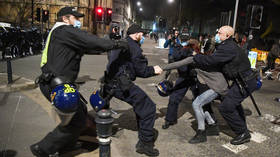UK parliamentary probe finds police forces breached ‘fundamental rights’ at Sarah Everard vigil & violent ‘Kill the Bill’ protest

Citing “multiple failings” in the police handling of the Sarah Everard vigil and a ‘Kill the Bill’ protest in March, an all-party UK parliamentary inquiry has accused the respective forces involved of violating fundamental rights.
In a report on the two incidents, the All-Party Parliamentary Group on Democracy and the Constitution (APPGDC) blasted both Scotland Yard and Avon and Somerset Police for their wrongful application of Covid laws in response to the events in London and Bristol.
Contending that their “failure” to provide “transparency and clarity” about how lockdown rules would be enforced in relation to “peaceful protest” constituted a breach of fundamental rights, the APPGDC said both forces “failed to understand their legal duties in respect of protest” and “failed to conduct a proper assessment of the proportionality of their actions.”
“The police must not become the enforcement agency of the state against those who choose to publicly and collectively call for change – political, economic, social or environmental,” Labour MP Geraint Davies, who chaired the inquiry, told the media.
Noting that the right to peaceful protest “must be supported not suppressed by the law,” Davies added that the police should help “facilitate the expression of peaceful protest and not drive opposition underground.”
Also on rt.com Met Police handling of vigil for murdered Londonder Sarah Everard was ‘appropriate,’ review findsHowever, the report also acknowledged that police were put in “difficult situations” due to “ambiguity” surrounding the government’s Covid rules.
The Met Police had been roundly criticised after employing heavy-handed tactics and arresting people gathering for a vigil in South London for Everard, the 33-year-old woman whose remains were found after being abducted and raped by a serving Met officer in early March.
An official report from police watchdog body HM Inspectorate of Constabulary and Fire and Rescue Services (HMICFRS) did not find fault with the Met’s response to the event, but called out its “tone deaf” attitude to criticism.
The inquiry also suggested that officers taking action against protesters – and failing to work with vigil organisers – had “increased the risk to both officers and civilians” and “created the conditions for their later enforcement intervention.” As well, it said the police action “may have increased the risk of Covid-19 transmission at the vigil.”
Meanwhile, the report noted that Avon and Somerset officers responding to the ‘Kill the Bill’ protest in Bristol – against the government’s Police, Crime, Sentencing and Courts Bill (PCSC), which would give sweeping public order powers to police – used “excessive force against peaceful protesters.”
The protest started peacefully but later became a riot that saw demonstrators clash with officers. While the inquiry noted that the police “faced real violence,” it said they “failed to distinguish between those protesting peacefully and those engaged in acts of violence.”
Also on rt.com ‘Kill the Bill’: Londoners march against proposed law that would give police more powers to crack down on public protests (VIDEOS)The APPGDC also proposed amendments to the PCSC, which is scheduled to be debated in Parliament on Monday, as a result of the findings which deemed additional policing powers “unnecessary” and called instead for a new “code” to determine police response to protests.
The government has said the PCSC bill is designed to allow officers to “better manage protests” so as to let “legitimate protest groups... make their voices heard” while not “disrupting the lives and livelihoods of others.”
However, the inquiry said the proposed law would place police officers in an “unfair position” and affect the “legitimacy of the police” as a non-political service.
Met Police Assistant Commissioner Louisa Rolfe said she “stands by the actions of those officers who policed” the vigil, noting they faced “an extraordinarily challenging circumstance” and “followed national guidance... taking enforcement action as a very last resort.”
The Avon and Somerset force “strongly refuted some of the findings” and “rejected any suggestion” that it did not “facilitate peaceful demonstrations on the day of the riot and for subsequent protests.”
If you like this story, share it with a friend!













